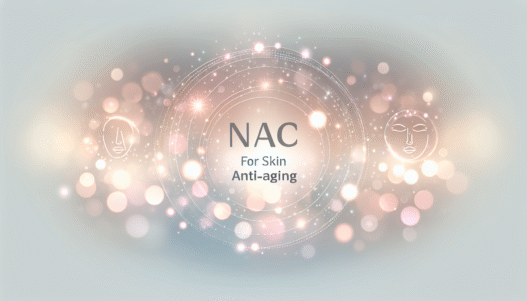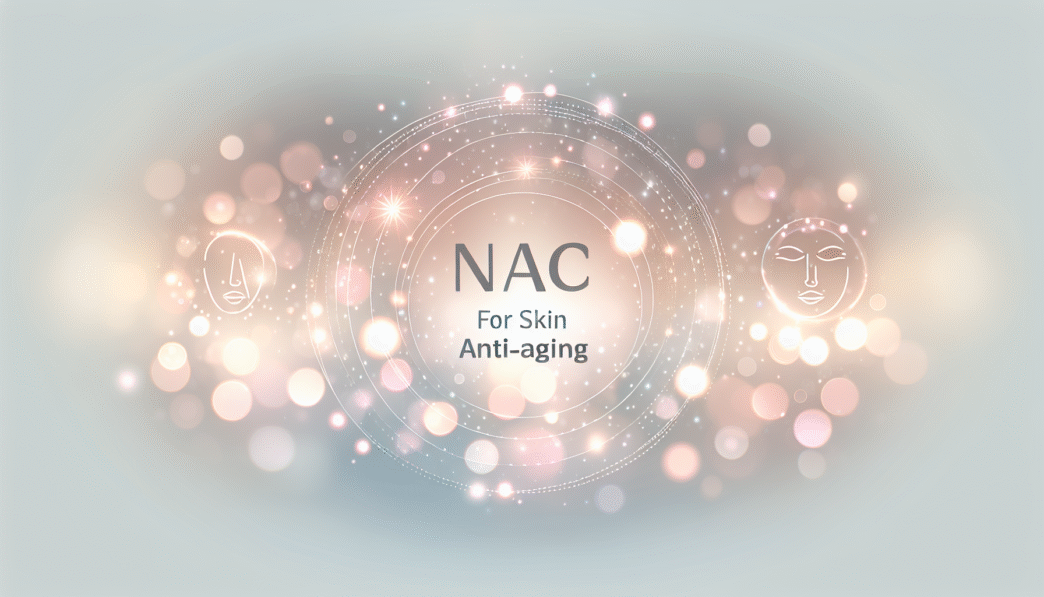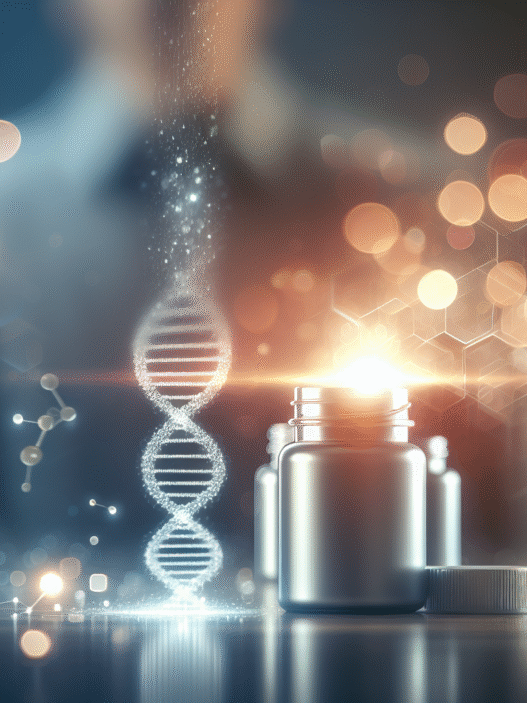Understanding NAC for Skin
N-Acetyl Cysteine (NAC) is emerging as a prominent ingredient in skincare for its potential anti-aging benefits. This section explores NAC’s role in glutathione production and its protective benefits for the skin, making it an important addition to any skincare routine.
Role of NAC in Glutathione Production
NAC plays an essential role in replenishing and maintaining glutathione levels in the body. Glutathione is a powerful antioxidant that is crucial for neutralizing free radicals and protecting cells from environmental damage. By boosting glutathione production, NAC helps support the skin’s protective and regenerative abilities, offering a defense against oxidative damage due to UV exposure, pollution, and other harmful environmental factors (City Skin Clinic).
| Key Function | Description |
|---|---|
| Antioxidant Support | Replenishes glutathione levels, neutralizing free radicals. |
| Environmental Protection | Protects skin from oxidative damage caused by UV rays and pollutants. |
Benefits of NAC for Skin Protection
The antioxidant properties of NAC are particularly beneficial in combatting the signs of aging. Studies indicate that NAC can help reduce the appearance of fine lines and wrinkles by promoting collagen production and improving skin elasticity. This makes it an effective ingredient in anti-aging formulations (Frontrow Luxxe Products).
Additionally, NAC exhibits anti-inflammatory properties, which can aid in reducing acne breakouts and calming irritated skin. Incorporating NAC into a skincare routine not only enhances skin health but also contributes to a more youthful appearance. Its synergistic effects with other skincare ingredients can further amplify its benefits (Frontrow Luxxe Products).
| Skin Benefit | Description |
|---|---|
| Reduces Fine Lines | Promotes collagen production for a smoother appearance. |
| Calms Inflammation | Helps reduce acne and irritation in the skin. |
In the search for effective anti-aging solutions, nac for skin anti-aging offers a compelling option for those concerned about skin health and longevity. The integration of NAC into skincare routines is proving beneficial across a range of skin concerns, supporting overall skin vitality while addressing signs of aging. For further insights, please visit our page on n-acetyl cysteine skin rejuvenation.
NAC in Skincare
N-Acetyl Cysteine (NAC) offers a range of benefits for skin health, particularly in promoting anti-aging effects. This section explores how NAC enhances skin repair mechanisms, its synergistic effects with other skincare ingredients, and key considerations for incorporating NAC into skincare routines.
Enhancing Skin Repair Mechanisms
NAC plays a pivotal role in supporting the skin’s protective and regenerative abilities. It links to glutathione production, which acts as an essential antioxidant, protecting cells from oxidative damage caused by UV exposure, pollution, and other environmental stressors. Studies indicate that NAC also promotes wound healing. It has shown potential in increasing vascular endothelial growth factor (VEGF) expression, which aids in angiogenesis and improves wound-breaking strength. For individuals dealing with skin conditions such as lamellar ichthyosis, topical application of NAC has led to notable improvements in skin texture after consistent use.
| Skin Benefit | Mechanism |
|---|---|
| Wound Healing | Promotes angiogenesis and increases VEGF expression |
| Brightening | Evens skin tone and reduces hyperpigmentation |
| Antioxidant Protection | Protects against oxidative damage from environmental factors |
For further information on skin benefits of NAC, refer to n-acetyl cysteine skin benefits.
Synergistic Effects with Skincare Ingredients
NAC can enhance the performance of existing skincare ingredients and improve overall skin health. Its anti-inflammatory properties help reduce acne breakouts and calm irritated skin, making it effective for treating conditions like acne vulgaris. A study indicated that NAC could reduce sebum production while improving acne symptoms. It has also shown efficacy in several dermatologic conditions, including atopic dermatitis and toxic epidermal necrolysis when used in conjunction with other treatments.
| Condition | Effect of NAC |
|---|---|
| Acne Vulgaris | Reduces sebum production and improves symptoms |
| Atopic Dermatitis | Reduces inflammation and irritation |
| Toxic Epidermal Necrolysis | Alternative treatment option in refractory cases |
NAC should be used as part of a well-rounded skincare routine for long-term results. To learn more about how NAC complements skin health, visit nac for skin health.
Considerations for NAC in Skincare
While NAC is generally well-tolerated as a skincare ingredient, it may cause irritation or allergic reactions in some individuals, particularly those with sensitive skin or existing chronic conditions. Consulting with a dermatologist before use is advisable to avoid adverse reactions. It’s also essential to note that NAC’s bioavailability is quite low when applied topically (<10%), and its effectiveness may vary based on skin type and condition.
| Consideration | Details |
|---|---|
| Irritation Potential | Mild, but varies with skin sensitivity |
| Bioavailability | Low (<10%) in topical applications |
| Dermatological Consultation | Recommended prior to use |
For those looking to incorporate NAC into their regimen, it’s crucial to familiarize oneself with proper dosages and formulations. More insights can be found in our article on n-acetyl cysteine dosage.
NAC for Skin Concerns
Versatility in Addressing Skin Issues
N-Acetyl Cysteine (NAC) demonstrates remarkable versatility in tackling various skin issues. This compound plays a crucial role in replenishing glutathione levels in the body, which is essential for protecting the skin against environmental damage. By neutralizing free radicals, NAC assists in safeguarding the skin from oxidative stress caused by factors such as UV exposure and pollution.
NAC is particularly effective for addressing acne concerns. A study published in the Journal of Clinical and Aesthetic Dermatology noted that NAC reduced sebum production and improved symptoms in patients suffering from acne vulgaris (Frontrow Luxxe Products). Additionally, its anti-inflammatory properties can help calm irritated skin and reduce acne breakouts, making NAC a valuable ingredient in acne treatment regimens.
| Skin Concern | NAC Benefits |
|---|---|
| Acne Vulgaris | Reduces sebum production and improves symptoms |
| UV Damage | Inhibits UV-induced damage and protects skin cells |
| Inflammation | Calms irritated skin and reduces breakouts |
Complementing Skincare Routines
NAC can also enhance the effectiveness of existing skincare routines by complementing other active ingredients. Its role in supporting glutathione production means it can synergistically work with other antioxidants, boosting their efficacy and helping maintain skin health. Incorporating NAC into a skincare regimen can provide additional protection against environmental stressors while promoting skin repair and rejuvenation.
When integrating NAC into skincare routines, individuals can consider using NAC-infused products or supplements. For more information on the potential benefits of NAC in skincare, refer to our article on n-acetyl cysteine for skin.
As a powerful antioxidant with broad applications, NAC is becoming an essential component in the fight against aging and other skin concerns. Whether aiming for acne treatment or seeking overall skin health, the inclusion of NAC could make a significant difference in any skincare routine. For more insights, check out our articles on nac for anti-aging and nac for skin health.
Safety and Efficacy of NAC
Tolerance and Allergic Reactions
N-Acetylcysteine (NAC) is generally regarded as a mild and well-tolerated ingredient in topical skincare. However, some individuals may experience irritation, dryness, or allergies, particularly those with severe sensitivities or chronic skin conditions. It’s crucial for these individuals to consult with a dermatologist before incorporating NAC into their skincare routines (City Skin Clinic).
While NAC is often safely used, certain adverse effects can occur, including gastrointestinal symptoms such as nausea and vomiting. In some cases, especially with intravenous administration, more significant reactions have been reported (PMC). Anaphylactoid reactions, though rare, are a serious consideration when using NAC.
Individuals considering NAC for skin anti-aging should be aware of these potential reactions and monitor their skin for any unwanted effects during initial use.
Efficacy in Dermatologic Conditions
NAC has shown efficacy in treating various dermatologic conditions, highlighting its versatility beyond just anti-aging benefits. Research indicates that NAC is effective for conditions such as excoriation disorder, trichotillomania, onychophagia (nail-biting), acne vulgaris, and more (PubMed Central).
In a clinical study, treatment with NAC resulted in a statistically significant increase in nail length for patients with onychophagia after just one month. This suggests that NAC not only supports skin health but can also positively impact other aspects of dermatological care (NCBI).
The effectiveness of NAC in these contexts illustrates its role in promoting overall skin health, making it a beneficial ingredient for various skin concerns. For those looking into NAC for skin rejuvenation, resources such as n-acetyl cysteine for skin and nac for skin health can provide additional insights into its applications and benefits.
NAC’s Role Beyond Skin
N-Acetyl Cysteine (NAC) is well-known for its benefits related to skin anti-aging, but its advantages extend beyond this realm. NAC plays significant roles in liver and kidney health, mental well-being, and respiratory health.
NAC’s Impact on Liver and Kidney Health
NAC aids in detoxification processes that help prevent liver and kidney damage. It is often administered to individuals experiencing acetaminophen overdose to mitigate the risk of organ damage. By replenishing glutathione levels, NAC supports the body in neutralizing harmful substances and protecting essential organs.
| Organ | Impact of NAC |
|---|---|
| Liver | Prevents damage from toxins like acetaminophen |
| Kidneys | Aids detoxification and reduces risk of impairment |
Mental Health Benefits of NAC
NAC has been recognized as a potential therapeutic strategy for various psychiatric disorders, including schizophrenia, bipolar disorder, and depression. It has shown moderate benefits in reducing clinical severity and improving symptoms and cognitive performance in affected individuals (PMC).
| Mental Health Condition | NAC Benefits |
|---|---|
| Schizophrenia | Reduces severity of symptoms |
| Bipolar Disorder | Improves mood stability |
| Depression | Enhances overall mental health |
Respiratory Health and NAC
NAC has been explored for its effects on lung diseases such as chronic obstructive pulmonary disease (COPD), cystic fibrosis (CF), and idiopathic pulmonary fibrosis (IPF). Clinical findings suggest that NAC may reduce acute exacerbations in COPD and improve lung function in CF patients. However, the effectiveness in treating IPF remains controversial across various studies.
| Lung Condition | NAC Outcomes |
|---|---|
| COPD | Reduces exacerbations |
| Cystic Fibrosis | Improves lung function |
| Idiopathic Pulmonary Fibrosis | Controversial efficacy |
NAC’s multifaceted roles in health highlight its importance not just for skin anti-aging but for overall bodily well-being. For those interested in the extensive potential of NAC, further information can be found regarding its benefits and dosage recommendations. Its versatility makes it a valuable addition to a holistic health regimen for longevity seekers.
NAC in Disease Management
N-Acetyl Cysteine (NAC) is increasingly being recognized for its potential benefits beyond skin health, particularly in disease management. It plays a significant role in various conditions, including neurodegenerative disorders, cardiovascular health, and chronic illnesses.
Alzheimer’s and Parkinson’s Diseases
NAC has garnered attention for its possible effects on neurological conditions such as Alzheimer’s and Parkinson’s diseases. Research indicates that NAC may improve the symptoms associated with these diseases by replenishing glutathione levels and regulating glutamate in the brain. This action helps to combat oxidative stress, which is linked to neurodegeneration (Healthline). Its antioxidant properties make NAC a valuable component in addressing cognitive decline.
| Condition | Potential Benefits of NAC |
|---|---|
| Alzheimer’s | May improve memory and cognitive function |
| Parkinson’s | Potentially ameliorates motor symptoms |
Cardiovascular Benefits
The benefits of NAC extend to cardiovascular health as well. By playing a crucial role in the production of glutathione, one of the body’s most significant antioxidants, NAC helps to neutralize free radicals and reduce oxidative stress, which is a contributing factor to cardiovascular diseases. Clinical trials have demonstrated NAC’s effectiveness in improving cardiac function, particularly in conditions such as:
| Condition | Role of NAC |
|---|---|
| Diabetic Cardiomyopathy | Reduces heart muscle damage |
| Acute Myocardial Infarction | Improves recovery and reduces complications |
| Heart Failure | Enhances overall cardiac function |
| Coronary Artery Disease | Supports vascular health and function |
Impact on Chronic Conditions
NAC is also recognized for its potential in managing various chronic conditions by alleviating symptoms and improving overall health. Its antioxidant and anti-inflammatory properties make it effective in combating diseases linked to oxidative stress, including chronic respiratory conditions and liver diseases. Studies have shown that NAC can enhance the response to treatments such as interferon-alpha in chronic hepatitis C patients, showcasing its versatility as a therapeutic agent.
By considering NAC’s comprehensive benefits in disease management, individuals looking to improve their health and longevity can incorporate it into their wellness routines, while also being mindful of its benefits for skin health and anti-aging effects.





















